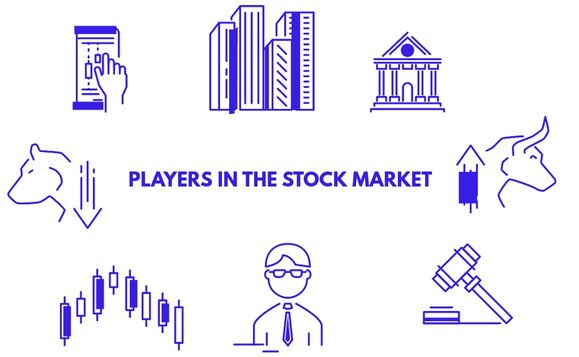Stock Market Intermediaries
From the time you enter the market till the time the shares hits your DEMAT account a lot of entities are involved to ensure that the stock reaches your account.
These entities mainly work behind the scenes to ensure the smooth processing of your transaction while complying with the rules and regulations laid down by SEBI.
These entities are called the financial intermediaries and together these intermediaries, that are interdependent of each other create the ecosystem of the financial market.
Let’s take a look at these intermediaries.
Market Participants
The Stock market is a place where individuals, as well as institutions also participate. Anyone who participates in the stock market is called a Market participant. The market participants are classified into the following categories:-
- Domestic Retail Participants – These are people like you and me transacting in markets, also called Individual investors.
- NRI’s and OCI – These are people of Indian origin but based outside India
- Domestic Institutions – These are large corporate entities based in India. A classic example would be the LIC of India.
- Domestic Asset Management Companies (AMC) – Typical participants in this category would be the mutual fund companies such as SBI Mutual Fund, DSP Black Rock, Fidelity Investments, HDFC AMC, etc.
- Foreign Institutional Investors – Non-Indian corporate entities. These could be foreign asset management companies, hedge funds, and other investors.
Irrespective of which type of investor you are, the agenda is the same; you want to make money and so do others.
When large amounts of money are involved, it is very easy to get involved in unfair practices. India has had its shares of scams and one of the biggest ones was the Harshad Mehta Scam that happened in the early ’90s. This scam showed that we needed someone to regulate the market and ensure that the game is fair by setting up the regulations and compliance rules.
So with this in mind, SEBI was made the statutory body in 1992 and today SEBI is the regulating authority for exchanges and they see to it that the business on exchanges (BSE/NSE) is conducted fairly, there is no unfair practice employed either by brokers or by corporates, markets are not manipulated by the large institutional players and the interest of the retail investors is protected.
Stock Broker
The very first of these is the Stock Broker. A Stockbroker is in fact the gateway to the stock market.
A stockbroker is a corporate entity, registered as a trading member with the stock exchange and holds a stockbroking license. They operate under the guidelines prescribed by SEBI.
The very first thing that you need to do is to open a trading account with your broker. Once you have opened a trading account, you can undertake financial transactions in the market. The trading account allows you to buy/sell securities in the market through the broker. So a stockbroker is your authorized representative in the financial market through whom you need to put the orders when you buy or sell any security.
They will place the order on your behalf when you want to buy and ensure that the security is transferred to you within a given time frame. Similarly when you sell a security, they place the order on your behalf, sell it, ensure that the buyer gets the security after taking it from your account and ensure that the money is received in your bank account within the stipulated time frame.
Whenever you are buying or selling a security you need to contact the stockbroker and you can do this in 3 ways.
- Go to the broker’s office
- Call the broker on the phone
- Online; Do it yourself – This seems to be the most popular way in today’s world as you have access to the trading terminal through which you can place the order which then is confirmed on the other end by the dealer.
The basic services that are provided by the brokers are the following:-
- Give you access to the trading terminals
- Provide you with the margins
- Provide you with support if you are calling and placing orders over the phone or if you are having issues with software
- Issue the contract notes
- Ensure the security is transferred to your account within the stipulated time
- Ensuring fund transfer to your bank account
- Provide you with the summary of your activity or give you access to the back office where you can view your transactions
For all these services, the broker charges a fee which is called the brokerage charge or just the brokerage. Brokerage charges vary from broker to broker and it is up to you to decide on the broker who strikes a balance between the fee he charges to the services he provides.
The second most important intermediary is the Depository Participant and the Depository.
Depository participant and Depository
When you buy a share, you have to show a document to prove that you are the actual owner of the share. This document is called the share certificate.
Earlier the share certificates used to be in paper form but since 1996 these are in electronic form. However, someone is required to hold these digital shares. These digital share certificates are held with the depository participants. So your DEMAT account is like a vault in a bank that holds all your securities that are held in digital form. In that case, what is the Depository?
A Depository is like the Central bank, RBI where all the depository participants have an account. In India, we have two depositories; National Securities Depository Limited (NSDL) and Central Depository Services (India) Limited(CDSL).
NSCCL and ICCL
National Security Clearing Corporation Ltd and Indian Clearing Corporation are wholly owned subsidiaries of the National Stock Exchange and Bombay Stock Exchange. The job of the clearing corporation is to ensure guaranteed settlement of your trades/transactions.
For example, if you were to buy 1 share of Biocon at Rs.446 per share, there must be someone who has sold that 1 share to you at Rs.446. For this transaction, you will be debited Rs.446 from your trading account, and someone must be credited that Rs.446 toward the sale of Biocon. In a typical transaction like this, the clearing corporation’s role is to ensure the following:
- a) Identify the buyer and seller and match the debit and credit process
- b) Ensure no defaults – The clearing corporation also ensures there are no defaults by either party. For instance, after selling the shares, the seller should not be in a position to back out, thereby defaulting in his transaction.
Banks
Banks are a very important part of the market ecosystem and play a very straightforward role. They help facilitate fund transfer to/and from your bank account from/to your trading account.
Stock Market Intermediaries
From the time you enter the market till the time the shares hits your DEMAT account a lot of entities are involved to ensure that the stock reaches your account.
These entities mainly work behind the scenes to ensure the smooth processing of your transaction while complying with the rules and regulations laid down by SEBI.
These entities are called the financial intermediaries and together these intermediaries, that are interdependent of each other create the ecosystem of the financial market.
Let’s take a look at these intermediaries.
Market Participants
The Stock market is a place where individuals, as well as institutions also participate. Anyone who participates in the stock market is called a Market participant. The market participants are classified into the following categories:-
- Domestic Retail Participants – These are people like you and me transacting in markets, also called Individual investors.
- NRI’s and OCI – These are people of Indian origin but based outside India
- Domestic Institutions – These are large corporate entities based in India. A classic example would be the LIC of India.
- Domestic Asset Management Companies (AMC) – Typical participants in this category would be the mutual fund companies such as SBI Mutual Fund, DSP Black Rock, Fidelity Investments, HDFC AMC, etc.
- Foreign Institutional Investors – Non-Indian corporate entities. These could be foreign asset management companies, hedge funds, and other investors.
Irrespective of which type of investor you are, the agenda is the same; you want to make money and so do others.
When large amounts of money are involved, it is very easy to get involved in unfair practices. India has had its shares of scams and one of the biggest ones was the Harshad Mehta Scam that happened in the early ’90s. This scam showed that we needed someone to regulate the market and ensure that the game is fair by setting up the regulations and compliance rules.
So with this in mind, SEBI was made the statutory body in 1992 and today SEBI is the regulating authority for exchanges and they see to it that the business on exchanges (BSE/NSE) is conducted fairly, there is no unfair practice employed either by brokers or by corporates, markets are not manipulated by the large institutional players and the interest of the retail investors is protected.
Stock Broker
The very first of these is the Stock Broker. A Stockbroker is in fact the gateway to the stock market.
A stockbroker is a corporate entity, registered as a trading member with the stock exchange and holds a stockbroking license. They operate under the guidelines prescribed by SEBI.
The very first thing that you need to do is to open a trading account with your broker. Once you have opened a trading account, you can undertake financial transactions in the market. The trading account allows you to buy/sell securities in the market through the broker. So a stockbroker is your authorized representative in the financial market through whom you need to put the orders when you buy or sell any security.
They will place the order on your behalf when you want to buy and ensure that the security is transferred to you within a given time frame. Similarly when you sell a security, they place the order on your behalf, sell it, ensure that the buyer gets the security after taking it from your account and ensure that the money is received in your bank account within the stipulated time frame.
Whenever you are buying or selling a security you need to contact the stockbroker and you can do this in 3 ways.
- Go to the broker’s office
- Call the broker on the phone
- Online; Do it yourself – This seems to be the most popular way in today’s world as you have access to the trading terminal through which you can place the order which then is confirmed on the other end by the dealer.
The basic services that are provided by the brokers are the following:-
- Give you access to the trading terminals
- Provide you with the margins
- Provide you with support if you are calling and placing orders over the phone or if you are having issues with software
- Issue the contract notes
- Ensure the security is transferred to your account within the stipulated time
- Ensuring fund transfer to your bank account
- Provide you with the summary of your activity or give you access to the back office where you can view your transactions
For all these services, the broker charges a fee which is called the brokerage charge or just the brokerage. Brokerage charges vary from broker to broker and it is up to you to decide on the broker who strikes a balance between the fee he charges to the services he provides.
The second most important intermediary is the Depository Participant and the Depository.
Depository participant and Depository
When you buy a share, you have to show a document to prove that you are the actual owner of the share. This document is called the share certificate.
Earlier the share certificates used to be in paper form but since 1996 these are in electronic form. However, someone is required to hold these digital shares. These digital share certificates are held with the depository participants. So your DEMAT account is like a vault in a bank that holds all your securities that are held in digital form. In that case, what is the Depository?
A Depository is like the Central bank, RBI where all the depository participants have an account. In India, we have two depositories; National Securities Depository Limited (NSDL) and Central Depository Services (India) Limited(CDSL).
NSCCL and ICCL
National Security Clearing Corporation Ltd and Indian Clearing Corporation are wholly owned subsidiaries of the National Stock Exchange and Bombay Stock Exchange. The job of the clearing corporation is to ensure guaranteed settlement of your trades/transactions.
For example, if you were to buy 1 share of Biocon at Rs.446 per share, there must be someone who has sold that 1 share to you at Rs.446. For this transaction, you will be debited Rs.446 from your trading account, and someone must be credited that Rs.446 toward the sale of Biocon. In a typical transaction like this, the clearing corporation’s role is to ensure the following:
- a) Identify the buyer and seller and match the debit and credit process
- b) Ensure no defaults – The clearing corporation also ensures there are no defaults by either party. For instance, after selling the shares, the seller should not be in a position to back out, thereby defaulting in his transaction.
Banks
Banks are a very important part of the market ecosystem and play a very straightforward role. They help facilitate fund transfer to/and from your bank account from/to your trading account.








Leave A Comment